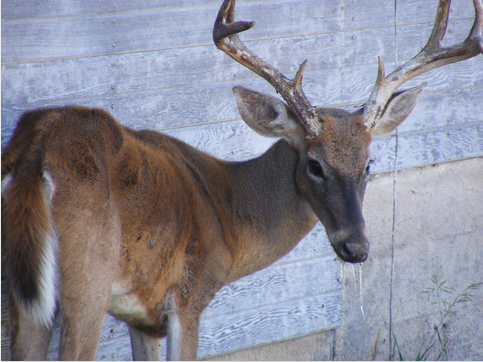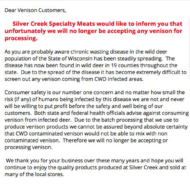
A longtime and well-known processor has quit handling venison due to concerns about chronic wasting disease, citing consumer safety.
Silver Creek Specialty Meats in Oshkosh, Wis., announced publicly and in letters to its customers in August that it would no longer accept venison for processing. The sausage-maker and processor has been in business since 1989, but its origins date to the 1940s with R-Line Foods, Inc., which was a division of the JM Smucker Co. in Ripon, Wis.
“Consumer safety is our number one concern and no matter how small the risk (if any) of humans being infected by this disease we are not and never will be willing to put profit before the safety and well being of our customers,” the Silver Creek owners announced in a post on its website.

Silver Creek Specialty Meats was established in 1989 when Dr. William Kramlich and his wife, Dorothy, established Silver Creek Specialty Meats in 1989 after it bought R-Line Foods from the JM Smucker Co. Kramlich is the former director of operations and president of Hillshire Farms of New London, Wis. Silver Creek Specialty Meats is now managed by sons Bill and Tom Kramlich and granddaughter Katy Lehman.
Silver Creek produces a variety of sausages, jerky, snack sticks and other products including “old world” style Gottenburg and Luxemburg sausages.

Chronic wasting disease has been confirmed in deer in 19 Wisconsin counties. The disease recently was the focus of a multi-day summit in Michigan.
There are no confirmed cases of CWD being transmitted to humans who have eaten CWD-infected deer or come in contact with CWD-infected deer, their organs, fluids or other parts. Research is ongoing about cross-species transmission involving Macque monkeys, as noted in this report from the Michigan summit.
The Centers for Disease Control and Prevention states that CWD may take more than a year to develop in infected deer. It also warns about ongoing precautions to ensure that CWD does not enter the human food chain: “However, animal studies suggest CWD poses a risk to some types of non-human primates, like monkeys, that eat meat from CWD-infected animals or come in contact with brain or body fluids from infected deer or elk. These studies raise concerns that there may also be a risk to people. Since 1997, the World Health Organization has recommended that it is important to keep the agents of all known prion diseases from entering the human food chain.”
The agency also offers suggestions about handling deer (or cervids) killed in areas known to have CWD:
To be as safe as possible and decrease their potential risk of exposure to CWD, hunters should take the following steps when hunting in areas with CWD:
- Do not shoot, handle or eat meat from deer and elk that look sick or are acting strangely or are found dead (road-kill).
When field-dressing a deer:- Wear latex or rubber gloves when dressing the animal or handling the meat.
- Minimize how much you handle the organs of the animal, particularly the brain or spinal cord tissues.
- Do not use household knives or other kitchen utensils for field dressing.
- Check state wildlife and public health guidance to see whether testing of animals is recommended or required. Recommendations vary by state, but information about testing is available from many state wildlife agencies.
- Strongly consider having the deer or elk tested for CWD before you eat the meat.
- If you have your deer or elk commercially processed, consider asking that your animal be processed individually to avoid mixing meat from multiple animals.
- If your animal tests positive for CWD, do not eat meat from that animal.

